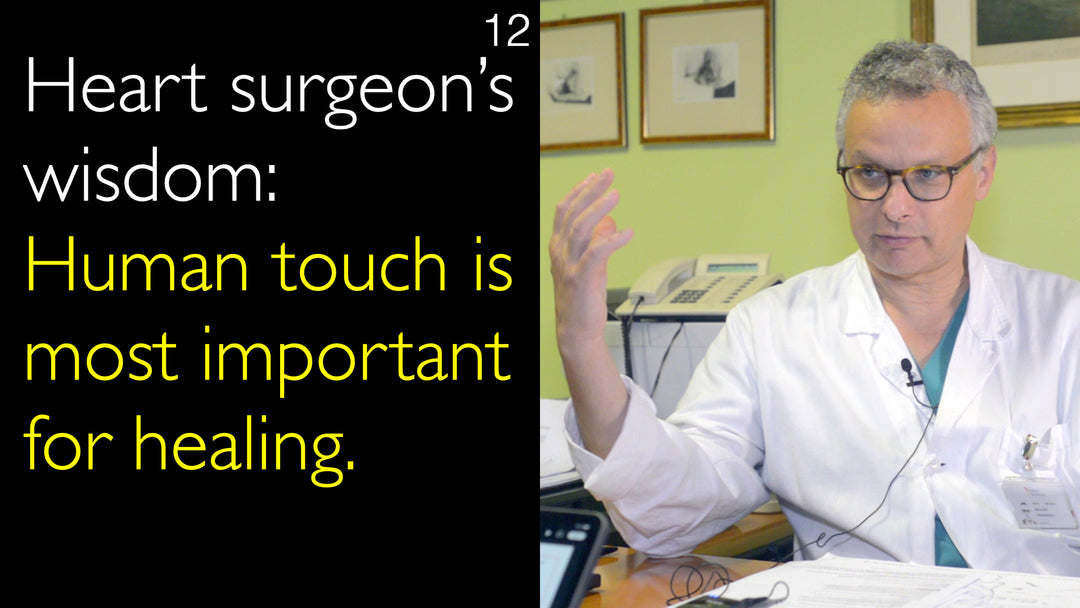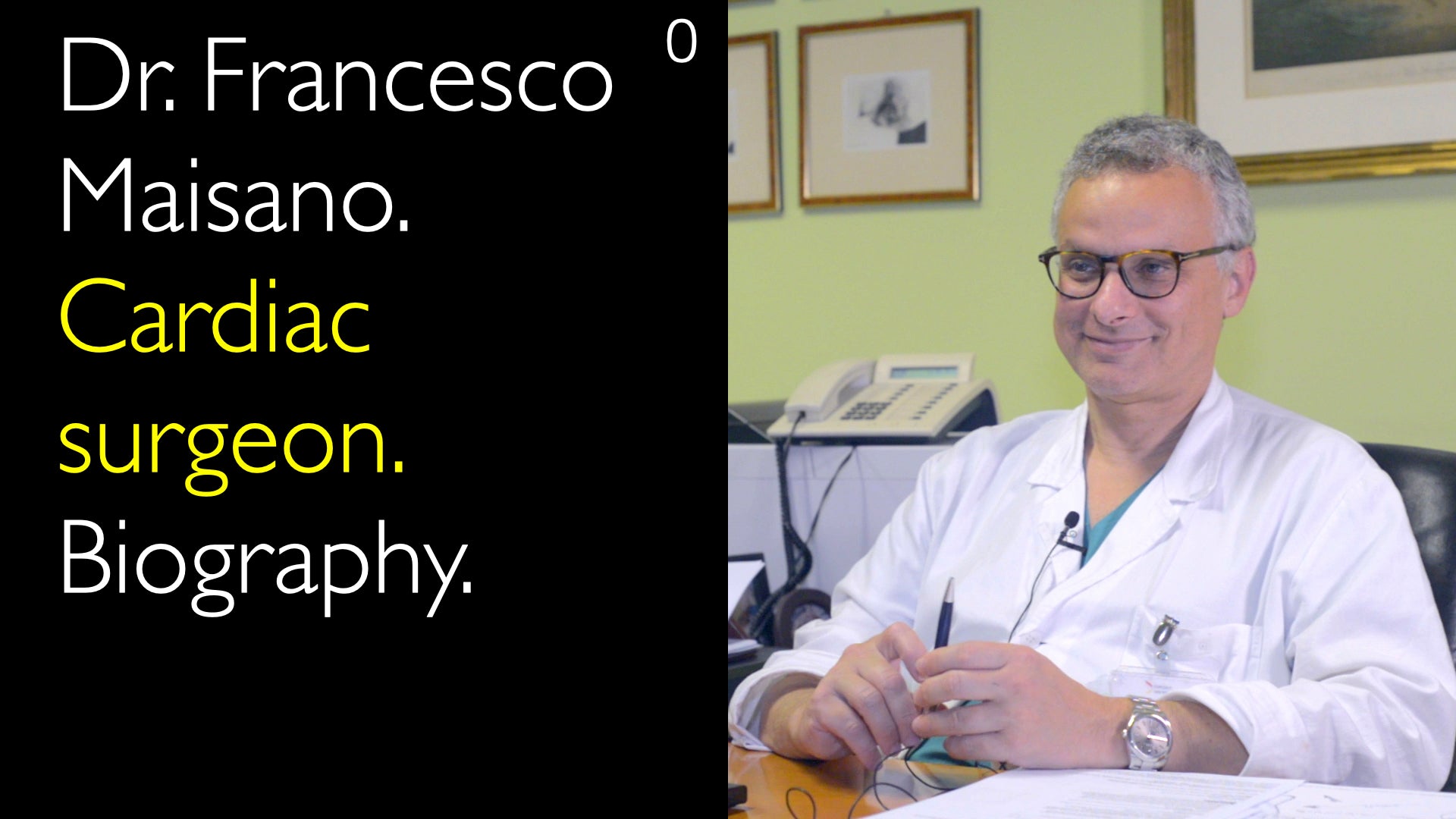Leading expert in cardiac surgery and medical innovation, Dr. Francesco Maisano, MD, explains the critical role of the human touch in modern medicine. He shares his personal journey from a technically-focused surgeon to a more holistic physician. Dr. Maisano advocates for a balance between technological advancement and ethical, human-centered patient care. He emphasizes that innovation must always focus on patient health and well-being. The core message is that doctors treat people, not just conditions.
The Human Element in Cardiac Surgery and Medical Innovation
Jump To Section
- Human Touch in Medicine
- Ethics & Education in Medical Practice
- Technical Focus vs Patient Care
- Innovation and Patient Well-being
- The Future of Cardiac Surgery
- Full Transcript
Human Touch in Medicine
Dr. Francesco Maisano, MD, emphasizes that the foundation of medical practice is fundamentally human. He states that despite working with advanced technology and artificial intelligence, doctors are ultimately treating people. Dr. Maisano believes the human connection will always remain an irreplaceable part of healing. This perspective is crucial in an era of rapidly evolving medical technology.
Ethics & Education in Medical Practice
A key insight from Dr. Francesco Maisano, MD, is that technological advancement revealed a critical gap in his own skills. He discovered that ethics, education, and human attitude were the main skills missing from his early practice. This realization came as he began developing new medical tools and procedures. Dr. Maisano's journey shows that technical expertise must be balanced with strong ethical foundations.
Technical Focus vs Patient Care
Dr. Francesco Maisano, MD, describes a common trajectory for many physicians starting their careers. Young doctors often focus intensely on achieving technical perfection and avoiding failure. This necessary focus can sometimes cause doctors to forget they are operating on a person. Dr. Francesco Maisano, MD, notes this is particularly true in highly technical specialties like cardiac surgery.
Innovation and Patient Well-being
Dr. Maisano's early experience with TAVI procedures in 2003-2004 transformed his approach to medicine. Treating high-risk elderly patients with multiple comorbidities made him become a better, more holistic doctor. He states that innovation should never be feared when it focuses on patient health and well-being. Dr. Anton Titov, MD, agrees, noting that technology should enhance rather than replace human care.
The Future of Cardiac Surgery
Dr. Francesco Maisano, MD, describes himself as an "unhappy doctor" driven by dissatisfaction with available tools. This dissatisfaction fuels his continuous pursuit of better outcomes for patients. The next crucial step in innovation, according to Dr. Maisano, is ensuring that advanced techniques can be performed by many physicians worldwide. This democratization of advanced care represents the future of cardiac surgery innovation.
Full Transcript
Dr. Anton Titov, MD: Professor Maisano, are there any questions I should have asked but didn't ask? Is there anything else you'd like to share with people around the world?
Dr. Francesco Maisano, MD: I think we discussed a lot of things. There is one aspect we could discuss, but it's not a matter of discussion. I just like to mention the human aspect of medicine. We are human beings—even a doctor who has done a path like mine. I have been connected with scientists, with engineers. I have been working with technology.
At the end of the day, the base of this cycle is always human. And we are humans. So when we talk about artificial intelligence, when we talk about technology, sometimes we like to speak about these tools. But at the end of the day, we are treating people, humans, friends, peers. So the human touch is something that will never be disconnected from our practice.
I want to tell you one thing that is very personal. Opposite to what people may think, as soon as I started doing technology, advanced technology, as soon as I started to develop new tools, I realized that the main skill, which was missing in my practice, was ethics and education, and human attitude.
Many doctors, including me, when we start our practice, we are focused on the technical side. We want to be good. We don't want to fail; we want to be technically perfect. So we focus, and we really try to train ourselves and be reliable and good experts and do things, and so on. Usually, with this approach, we forget sometimes that what we do is done on a person. This may happen because it's so technical. Specifically, cardiac surgery is a technical profession.
Then I started doing TAVI at the beginning of 2000. We started in 2003 here, so very early. In 2003 or 2004, we started our first TAVI cases. At that time, this was a procedure offered only to very high-risk patients, older patients with many comorbidities. And we had done a lot of these cases. And what I learned at that time as a cardiac surgeon, I became an internal medicine expert. I became a better doctor.
So the message to my peers, to the younger generation, even to the patients is that you should not be afraid of innovation. Suppose innovation has focus on patient's health and patient's well being. This is what we have done all our life. And the reason why I am an innovator is that I am an unhappy doctor. I am never happy with what I get. I want to have more; I want to achieve more. I am unsatisfied with the tools which are available. And I try always to get something better than that.
I think we achieved a lot of that, and now we need to achieve the next step. I want to be sure that what I can do can be done by many others. That's the next step.
Dr. Anton Titov, MD: Thank you. Well, one of the reasons why I started this venture, the Diagnostic Detectives Network, is to emphasize the human side of medicine at the time when technology remarkably changes every field of medicine and surgery. Some people may think that it is blinking lights and buzzing sounds—the technology treating humans. But at the end of the day, it is humans who are helping humans to live a higher quality of life. And I think that's a very important part to emphasize. I'm very happy that you emphasized that as well.
Professor Maisano, thank you very much for this very interesting conversation, and we hope to revert to you in the future for more innovations in cardiac surgery. Thank you. Thank you!





